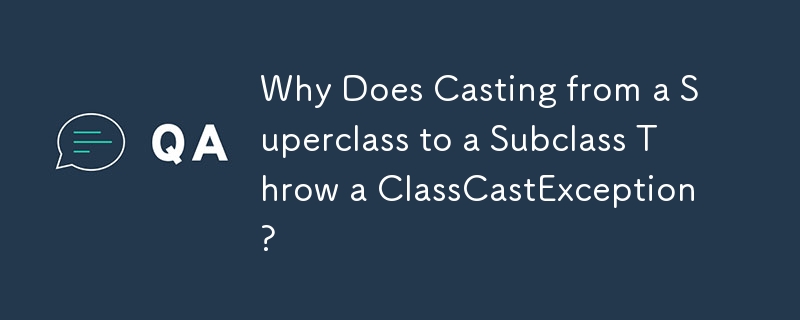

Implicit and Explicit Casting Between Superclasses and Subclasses
Casting plays a crucial role in object-oriented programming, allowing for seamless conversion between objects of different types. However, understanding the nuances of casting from a superclass to a subclass can be pivotal.
Consider the following code snippet:
public class Animal {
public void eat() {}
}
public class Dog extends Animal {
public void eat() {}
public static void main(String[] args) {
Animal animal = new Animal();
Dog dog = (Dog) animal;
}
}At first glance, it may seem intuitive that the assignment Dog dog = (Dog) animal; would be valid since Dog is a subclass of Animal. However, executing this code will result in a runtime ClassCastException.
Why is this?
The compiler's job is to analyze code and identify errors before execution. When it encounters the casting statement, it checks whether the Dog class is a valid subtype of Animal, which it is. Thus, it permits the casting operation without generating a compilation error.
However, the compiler's analysis is based on static information. At runtime, the program executes and the objects are allocated in memory. In this case, the animal variable references an object of type Animal, not Dog.
The Risk of Implicit Trust
When you cast an object, you're essentially affirming to the compiler, "I assure you that the object being cast is the correct type." In this situation, the compiler trusts your declaration and does not perform further verification.
However, if you cast an object incorrectly, as in the example above, the runtime environment discovers that the object's actual type does not match the declared type. This triggers a ClassCastException.
The Prudent Use of Casting
Understanding the limitations of implicit casting is crucial to avoid runtime errors. When casting from a superclass to a subclass, always employ explicit casting and thoroughly check the object's actual type using instanceof to ensure that the casting is valid. By adhering to these best practices, you can prevent unexpected exceptions and maintain the integrity of your code.
The above is the detailed content of Why Does Casting from a Superclass to a Subclass Throw a ClassCastException?. For more information, please follow other related articles on the PHP Chinese website!
 Vue parent component calls the method of child component
Vue parent component calls the method of child component
 What is digital currency trading
What is digital currency trading
 How to use fusioncharts.js
How to use fusioncharts.js
 length function usage
length function usage
 Cost-effectiveness analysis of learning python, java and c++
Cost-effectiveness analysis of learning python, java and c++
 Representation method of string constant
Representation method of string constant
 mysql transaction isolation level
mysql transaction isolation level
 How to open .dat files
How to open .dat files
 how to build a website
how to build a website




